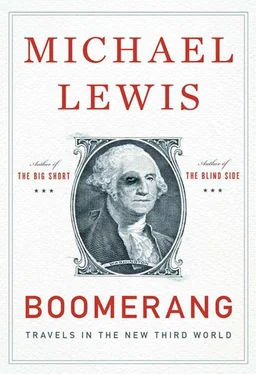What Germans did with money between 2003 and 2008 would never have been possible within Germany, as there was no one to take the other side of the many deals they did that made no sense. They lost massive sums, in everything they touched, from U.S. subprime loans to Greek government bonds. Indeed, one view of the European debt crisis—the Greek street view—is that it is an elaborate attempt by the German government on behalf of its banks to get their money back without calling attention to what they are up to. The German government gives money to the European Union rescue fund so that it can give money to the Irish government so that the Irish government can give money to Irish banks, so the Irish banks can repay their loans to the German banks. “They are playing billiards,” says Enderlein. “The easier way to do it would be to give German money to the German banks and let the Irish banks fail.” Why they don’t simply do this is a question worth trying to answer.
THE TWENTY-MINUTE WALK from the German Finance Ministry to the office of the chairman of Commerzbank, one of Germany’s two giant private banks, is punctuated by officially sanctioned memories: the new Holocaust Memorial, two and a half times the acreage occupied by the U.S. Embassy; the new street beside it, called Hannah Arendt Street; the signs pointing to Berlin’s new Jewish Museum; the park that contains the Berlin Zoo, where, after spending decades denying they had ever mistreated Jews, the authorities have newly installed, on the Antelope House, a plaque commemorating their Nazi-era expropriation of shares in the zoo owned by Jews. Along the way you also pass Hitler’s bunker, but you’d never know it was there, as it has been paved over by a parking lot, and the small plaque that commemorates it is well hidden. The streets of Berlin can feel like an elaborate shrine. It’s as if history stopped and assigned roles to people, and the Germans have been required to accept that they will always play the villain. On the other hand, it’s easier to express contrition about just about everything the less personally responsible one feels. The guilt is being so loudly expressed precisely because it is no longer personal and searing. Hardly anyone still alive is responsible for what happened here: everyone is. But when everyone is guilty, no one is.
At any rate, if some Martian landed on the streets of Berlin knowing nothing of its history, he might wonder: who are these people called “the Jews,” and how did they come to run this place? But there are no Jews in Germany, or not many. “The German people never see Jews,” says Gary Smith, the director of the American Academy in Berlin. “Jews are unreal to them. When they think of Jews they think of victims.” The further away the German people get from their victims, the more conspicuously they commemorate them. Of course no German in his right mind actually wants to sit around remembering the terrible crimes committed by his ancestors—and there are signs, including the memorials, that they are finding ways to move on. A good friend of mine, a Jew whose family was driven out of Germany in the 1930s, recently visited a German consulate in the United States to apply for a passport. He already held one European passport, but he worried that the European Union might one day fall apart, and he wanted access to Germany, just in case. The German official in charge—an Aryan out of central casting, wearing a Sound of Music vest—handed him a copy of a pamphlet titled A Jew’s Life in Modern Germany.
“ Would you mind if we take a picture?” he asked my friend, after processing his passport application.
“No problem,” said my friend.
“Can we do it in front of the flag?” asked the official.
My friend stared at the German flag. “What’s this for?” he asked.
“Our website,” said the German official, then added that the government hoped to post the photo with a sign that read: This man is the descendant of Holocaust survivors and he has decided to return to Germany.
COMMERZBANK WAS THE first private bank that the German government had to rescue during the financial crisis, with an injection of $25 billion, but that’s not why it had caught my attention. I’d been walking around Frankfurt one night with a German financier when I noticed the Commerzbank building on the skyline. There’s a law in Germany prohibiting buildings higher than twenty stories, but Frankfurt allows exceptions. The Commerzbank Tower is fifty-three stories high and unusually shaped: it resembles a giant throne. The top of the building, the arms of the throne, are more decorative than useful. The interesting thing, said the German financier, who visited often, is the glass room at the top, from which one looks down over Frankfurt. It is a men’s toilet. Commerzbank executives had taken him there to show him how, in full view of the world below, he could shit on Deutsche Bank.
The Commerzbank chairman, Klaus-Peter Müller, actually works in Berlin, inside another very German kind of place. His office is attached to the side of the Brandenburg Gate. The Berlin Wall once ran, roughly speaking, right through the middle of it. One side of his building was once a field of fire for East German border guards, the other a backdrop for Ronald Reagan’s famous speech. (“Mr. Gorbachev, open this gate. Mr. Gorbachev, tear down this wall!”) From looking at it you would never guess any of this. “After the wall came down we were offered the chance to buy it back,” says Müller. “This building had been ours before the war. But the condition was that we had to put everything back exactly the way it was. It all had to be hand-fabricated. ” He points out the seemingly antique brass doorknobs and the seemingly antique windows. Across Germany, in the past twenty years or so, town centers completely destroyed by bombs in World War II have been restored, stone by stone. The German government has agreed to pay some huge sum of money to rebuild the Berliner Schloss, the old Royal Palace that was leveled in the 1950s by the East German authorities, so that it will look exactly as it does in prewar photographs. If the trend continues, it will one day appear as if nothing terrible had ever happened in Germany, when everything terrible happened in it. “Do not ask me what it cost,” the bank chairman says, and laughs.
He then offers me the same survey of German banking that I will hear from half a dozen others. German banks are not, like American banks, mainly private enterprises. Most are either explicitly state-backed or small savings co-ops. Commerzbank, Dresdner Bank, and Deutsche Bank, all founded in the 1870s, are the only three big private German banks. In 2009 Commerzbank bought Dresdner. Both turned out to be loaded with toxic assets, and so the merged bank required a government bailout. “We are not a proprietary trading nation,” says Müller, getting pretty quickly to the nub of Germany’s banking problems. German banking was never meant to be a high-stakes affair. Banking, done in the proper German fashion, is less a free enterprise than a utility. “Why should you pay twenty million to a thirty-two-year-old trader?” Müller asks himself. “He uses the office space, the IT, the business card with a first-class name on it. If I take the business card away from that guy he would probably sell hot dogs.” This man is the German equivalent of the head of Bank of America or Citigroup. And he is actively hostile to the idea that bankers should make huge sums of money.
In the bargain, he tells me why the current financial crisis has so unsettled the German banker’s view of the financial universe. In the early 1970s, after he started at Commerzbank, the bank opened the first New York branch of any German bank, and he went to work in it. He mists up a bit when he tells stories about the Americans he did business with back then: in one story, an American investment banker who had inadvertently shut him out of a deal hunts him down and hands him an envelope with seventy-five grand in it, because he hadn’t meant for the German bank to get stiffed. “You have to understand,” he says emphatically, “this is where I get my view of Americans.” In the past few years, he adds, that view had changed. I sense a feeling of loss.
Читать дальше












